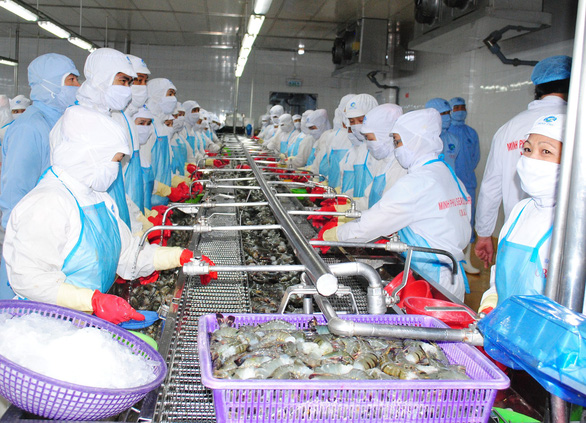 Economy
Economy


|
| Workers process shrimp at a factory in the Mekong Delta province of Cà Mau. — Photo tuoitre.vn |
HCM CITY — Shrimp is a key export item of many provinces in the Cửu Long (Mekong) River Delta, but the Covid-19 epidemic has caused challenges for exporters.
In the delta region, Cà Mau and Bạc Liêu are the top two provinces in shrimp export volume.
According to Bạc Liêu Province's Department of Industry and Trade, the province’s shrimp export revenue in January reached US$62 million, a year-on-year increase of 9 per cent.
Cà Mau Province earned $58 million in shrimp exports in January, an increase of 8 per cent over the same period last year, the Cà Mau Association of Seafood Exporters and Producers (CASEP) has said.
Trần Hoàng Em, general secretary of CASEP, said the province had over $1.15 billion last year in shrimp exports. Of the figure, exports to China were worth $102 million last year, accounting for 6-7 per cent of total exports, and nearly $7 million in January.
But due to the impact of the Covid-19 epidemic, many Chinese importers have told Vietnamese seafood exporters to suspend deliveries, he said.
The Cà Mau Department of Industry and Trade recently visited six seafood export companies in the province and discovered that seafood exports to China via border trade had faced problems, but exporting by waterway had not been affected much.
The buying volume from Chinese importers has also decreased due to transport restrictions, causing difficulties for enterprises in distributing the products.
According to the departments of Industry and Trade of localities in the region, if the epidemic continues for a prolonged period, it will cause adverse impacts on local exporters, including a high risk of cancellation of orders from importers.
If exporters face difficulties, they will reduce purchases of shrimp materials from farmers, resulting in a lower shrimp price and affecting farmers’ income, they said.
Nguyễn Việt Trung, head of commercial management division under the Cà Mau Department of Industry and Trade, said the department would keep a close eye on the epidemic situation and inform enterprises in a timely manner so they can come up with appropriate business plans.
They will also coordinate with relevant agencies to untie difficulties faced by exporters, especially in terms of capital.
Bạc Liêu Province will also have measures to support enterprises in production and export, and will strive to ensure sufficient material shrimp output for processing as well as the quality and traceability of the shrimp.
"Businesses need to boost exports to other markets rather than focus on the Chinese market amid the Covid-19 epidemic," Trung said. “In addition, local firms should take advantage of the EU-Việt Nam Free Trade Agreement, which will come into effect this year, to promote shrimp exports to the market.”
The Bạc Liêu Department of Industry and Trade said it expected that the export of frozen shrimp to Australia and other markets would increase in the coming time.
The Việt Nam Association of Seafood Exporters and Producers said that EU shrimp imports accounts for 31 per cent of the world’s total shrimp imports.
When the FTA comes into effect, local exporters will have a great opportunity to boost exports thanks to lower tariff duties. But to benefit from the FTA, Vietnamese shrimp products must meet requirements prescribed under the trade agreement, the association said. — VNS




